Sacred Work

I stopped by Stanford University Hillel to reunite with my Jewish family last summer — and I left with a new job. Leah Newman, our director of operations, was seeking an intern to help with donor correspondence and data management. An official chance to be Jewish, grateful and compulsively organized? I was thrilled.
Hillel has been an essential source of spiritual sustenance during my time at Stanford. What I didn’t realize was how valuable the communication and content creation skills I learned at Hillel would be on my path to becoming a rabbi.
As I’ve engaged in administrative tasks, I’ve found constant openings for spirituality. Rather than strictly viewing donations and contacts as data, I focus on the humanity of each of our donors and send a little prayer out with each piece of data I enter. I take an inhale of gratitude for each donor’s choice to engage with Hillel at Stanford, and I release an exhale of peace to the donors wherever they may be in that moment. Hillel has taught me that the most important aspect of communication is to respect the unique spirit of each person.
I’ve also had the chance to develop my creative side. From launching a Shabbat yoga series to designing graphics for social media, I’ve found there are always ways to add color to life at Hillel (and beyond). One of my favorite projects has been producing a series of video clips about Hillel for incoming freshmen. I can’t stop smiling as I watch diverse members of our Hillel family share their experiences with the next class of Stanford students. While it’s difficult to cut the recordings down to just two minutes, I relish identifying and showcasing the moments that best capture each student’s love for Hillel.
Over the course of my internship, I’ve learned about the behind-the-scenes effort that allows Hillel to serve our campus so successfully. Few in this world are as generous as our donors or as dedicated as our Hillel staff. Through my work, I’ve been able to join our donors and staff in the larger Jewish mission of cultivating vibrant and enriching resources for our community.
I had this mission in mind when I saw Hillel’s email about a remote summer internship with The Posen Library of Jewish Culture and Civilization, a growing print and online collection of worldwide primary sources from the biblical period to the 21st century. Hillel not only opened my eyes to this opportunity — it prepared me to approach The Posen Library with the passion and skills necessary for a rising Jewish professional.
Through my work with The Posen Library this summer, I’ve utilized my organizational and creative skills cultivated at Hillel to process excerpts from primary Jewish sources and highlight them on Twitter and Facebook. I’ve had the opportunity to read the works of incredible authors, from groundbreaking suffragist Ernestine Rose to the first openly gay Orthodox rabbi, Steven Greenberg. One of my favorite excerpts is from a piece by Uzi Ben Cnaan called “My Name is Barak,” describing how a boy becomes trapped in a barrel and uses his imagination to cope. I’ve created five themed reading guides highlighting a rich range of passages, and it brings me great joy to share them with a broader digital audience.
As I’ve read The Posen Library’s volumes, I’ve continued to think of a quote about mindfulness from Zen master Thich Nhat Hanh: “There are two ways to wash the dishes. The first is to wash the dishes in order to have clean dishes and the second is to wash the dishes in order to wash the dishes.” It’s possible to read texts in order to finish the volumes, but it’s infinitely more rewarding to read texts for the simple, wondrous sake of reading texts.
Like my work at Hillel, my work for The Posen Library is a chance to open myself to the potential vibrancy of each of my tasks. With every text I read, I’m introduced to a different face of Judaism. These faces come from all over the world and represent diverse perspectives that range from secular to rabbinic, medieval to feminist.
In allowing myself to truly gaze upon each text’s face, I honor the sacred sparks within my work. In this way, each day I work for The Posen Library, I feel even more deeply rooted in Judaism, thankfulness and organizational catharsis.
As I journey toward a future in the rabbinate, my path is enriched by my experiences with both Hillel and The Posen Library. It is often said that Judaism is a religion of not just faith, but action. Hillel has offered me spiritual vitality and, crucially, the professional skills to manifest this spirituality into actions that further uplift our community. And for this, my soul is abundant with gratitude.
Lizzie Frankel is a member of the Class of 2020 at Stanford University.